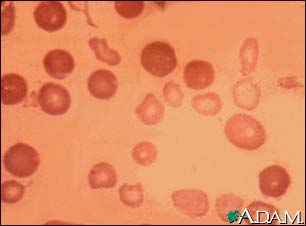Treatment
Treatment for thalassemia major often involves regular blood transfusions and folate supplements.
If you receive blood transfusions, you should not take iron supplements. Doing so can cause a high amount of iron to build up in the body, which can be harmful.
Persons who receive significant numbers of blood transfusions need a treatment called chelation therapy to remove excess iron from the body.
Bone marrow transplant may help treat the disease in some patients, especially children.
Prognosis (Expectations)
Severe thalassemia can cause early death due to heart failure a, usually between ages 20 and 30. Frequent blood transfusions with therapy to remove iron from the body helps improve the outcome.
Less severe forms of thalassemia usually do not result in a shorter life span.
Complications
Untreated, thalassemia major leads to heart failure and liver problems, and makes a person more likely to develop infections.
Blood transfusions can help control some symptoms, but may result in too much iron which can damage the heart, liver, and endocrine system.
Calling Your Health Care Provider
Call for an appointment with your health care provider if:
- You or your child has symptoms of thalassemia
- You are being treated for the disorder and new symptoms develop
Pictures & Images
Thalassemia major
-
Thalassemia: Overview, Causes
-
Thalassemia: Symptoms & Signs, Diagnosis & Tests
-
Thalassemia: Treatment
Review Date : 1/31/2010
Reviewed By : Linda J. Vorvick, MD, Medical Director, MEDEX Northwest Division of Physician Assistant Studies, University of Washington, School of Medicine; and Yi-Bin Chen, MD, Leukemia/Bone Marrow Transplant Program, Massachusetts General Hospital; and David Zieve, MD, MHA, Medical Director, A.D.A.M., Inc.
